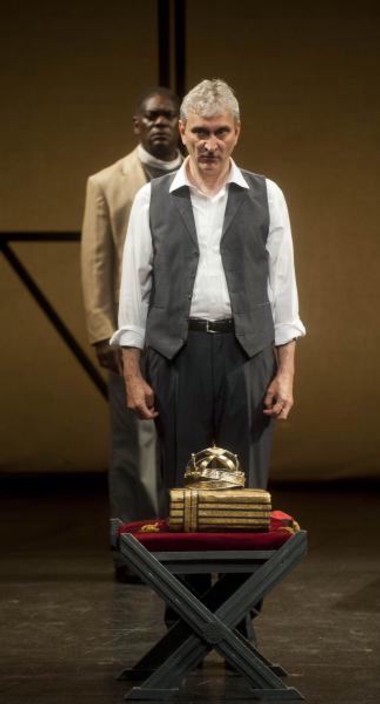Only three of Shakespeare & Company’s ten major productions this season are by Shakespeare. There’s another “classic,” by Molière, and all the rest are modern—the “& company” part of the troupe’s mission. One day last week, I saw two of the Shakespeares and the Molière—a three-course meal of classics in Lenox.
The season’s mainstage centerpiece is Shakespeare’s Love’s Labour’s Lost, a rarely performed early work by a young “upstart crow” eager to show off his chops. It’s a feast of language, brimming with literary conceits, obscure topical references and elaborate wordplay (including the title itself, whose meaning shifts depending on where you place the apostrophes). Lisa Wolpe’s lively production cuts a lot of obscure poetic underbrush and adds a lot of physical humor to the shamelessly silly plot, which involves a king and three noblemen taking an oath to forswear for a time all worldly pleasures—including the company of women—and devote themselves to austerity and study.
Their ascetic intentions are quickly upended by the arrival of a princess and her three (what a coincidence!) maids-in-waiting. Romantic madness ensues but, alone of Shakespeare’s comedies, in the end love’s labor is indeed lost, as the couples are not united but separated, at least tentatively.
Wolpe has set the piece, not in post-medieval Navarre but post-WWII, an era when ex-Rosie the Riveters, fresh from the front lines on the home front, were staking out their independence. Here, the King (Jason Asprey) limps from (presumably) a war wound, and the Princess (Brooke Parks) and her handmaids sport the era’s hip-hugging skirts and victory curls. The conceit, meant to lend a little gravity to the soufflé and underline the feist and fiber of the play’s women, claiming independence in the brave new postwar world, is interesting but largely irrelevant.
Among the other pairs of would-be lovers, I particularly enjoyed Mark Bedard, ebulliently ironic (yes) as the skeptical Berowne, and Nafeesa Monroe as his dark-lady love (an African American in the role described as “black,” which in Shakespeare’s time could apply to any brunette with a darker-than-peaches-and-cream complexion). There are several low-life subplots and a slew of eccentric characters, including Michael Toomey as the randy bumpkin Costard; Edgar Landa as the “fantastical” Spaniard Don Armado, a classic example of Shakespeare’s stock cowardly braggart; and Paula Langton, entertaining as pedant schoolteacher Holofernes, despite a weird disconnect between her bohemian persona and the character’s actual lines.
The conceptual updating in Richard II, the other mainstage Shakespeare, is more intriguing but again, only partially successful. In this tragedy of the deposing of a “divinely anointed” monarch, director Timothy Douglas sees a parallel to today’s evangelical megachurches led by charismatic preachers claiming God-given authority. So we see gray-suited theocrats hurling ripe Shakespearean insults and throwing down their Bibles instead of gauntlets as marks of challenge.
Early in the run, the production stumbled a bit, as actors tripped over some lines and the focus was a bit shaky. The same was true in the first half for Rocco Sisto in the title role, but as Richard progressively gives in to the surging rebellion, Sisto gathered a dizzying portrait of majesty in turmoil, torn between self-doubt and outrage at the affront to his divine right. As Bollingbroke (the future Henry IV), Tom O’Keefe came off too lightweight to be a credible usurper, but Jonathan Croy had gravitas aplenty as the plain-speaking elder, John of Gaunt, and so did Johnny Lee Davenport as the politically cunning Earl of Northumberland. Most of the supporting cast doubles in roles, including Rachel Leslie as Richard’s queen and, bafflingly, as an apparently preteen Harry Hotspur, supposedly Bollingbroke’s contemporary.
Molière’s farce L’Etourdi, ou Les Contretemps, often translated as The Blunderer, is currently tearing up S&Co’s Rose Footprint tent theater under the title Les Faux Pas, or The Counter-Plots. Cleverly adapted and boisterously staged by Jenna Ware, it’s a Commedia-derived escapade involving mistaken identities, slapstick chases, et al., and featuring the usual comic types, including jealous lovers, a tyrannical father-figure and a clever, rapscalliony servant. Jennie M. Jadow plays the latter in a nifty piece of cross-gender casting, alternately plotting and panicking. But it’s Justin Weaks, an inspired clown with a Gumby body, who really steals the show as the lunkheaded would-be Romeo.
In repertory at Shakespeare & Company, 70 Kemble St., Lenox. (413) 637-3353, shakespeare.org.
Contact Chris Rohmann at StageStruck@crocker.com,and check out the new StageStruck blog



